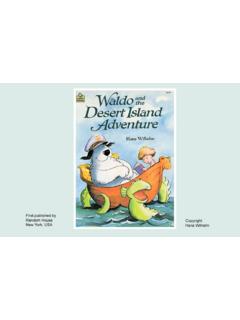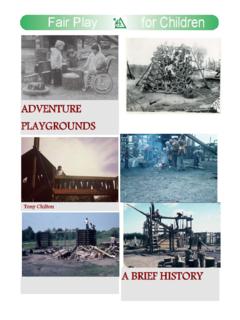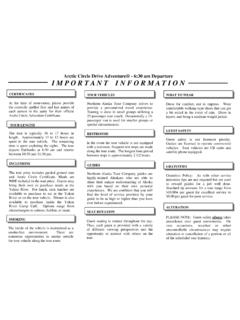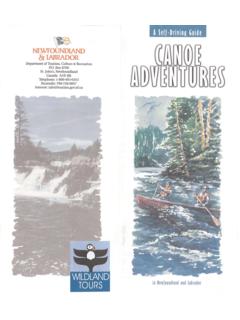Transcription of Pentecost as Adventure - orthodoxchristianed.com
1 Pentecost as Adventure Fr. Theodore Heckman Upbeat , , 1968 Very few of us, if any, consider the Feasts of the Church as adventures , yet they really are just that, divine-human adventures ready to be entered upon by any Christ-ened person. Christmas, for example, is a day not only for the remembrance of Christ s birth, but a day when He is born in us, and we become something more than human animals. The days of Lent leading finally to the Crucifixion these are days of our own repentance when we prepare for another birth, the Resurrection. And this Resurrection is again not a mere commemoration but a reality in which we along with the whole world are remade with new radiance and joy. Beyond these two, there is a third day of rebirth: the forty-day Resurrection period is ended by the apparent disappearance of Christ in His Ascension, only to be fulfilled by the coming of the Spirit on Pentecost when me were again remade into the divine-human image of Christ.
2 Such adventures , taking us through a series of rebirths, may not fill the ordinary definition of the term Adventure ; they do not take us to exotic lands through a course beset with strange adversities, yet the parallel is closer than we may have realized. The festal adventures while we are in our own communiti8es have the power to lift us beyond our present location, beyond even this world, into the Kingdom of God. And as for the adversities, just try taking seriously these feasts; you will soon see plenty of opposition. All this points to something very basic to the Christian experience, to the very meaning of Christian life: that life is not simply a matter of being as good as possible while awaiting the reward of paradise after death. Rather, the celebration of Feasts actualizes paradise for us and in us where we are right now.
3 Providing we participate in them fully, they can fill us and our surroundings with a transformed life. When Christ announced, Behold, I make all things new, this Adventure in transformation is what He meant. Pentecost , in particular, is the celebration of transformed life par excellence. In the background is the Jewish Feast of Weeks, which marked the beginning of the harvest. The first fruit of the year was brought in then, marking the fulfillment of all that God had promised to Israel. He had told them that they would be given a land flowing with milk and honey. Having struggled many years, through all sorts of difficulties, they now were receiving the first harvest of this land, and it was celebrated in the Feast of Weeks. After the coming of Christ, and because of all his activities having to other purpose than the renewal of all things, it is He that becomes the first-fruit of the New Creation, the fulfillment of God s further promise to Israel to restore humanity and all creation which had strayed from the intended mark.
4 Pentecost , then, becomes the Feast of the first harvest of the New Creation. Our churches on this day are decorated profusely with freshly-cut trees and flowers and the harvest includes, more importantly, the renewed souls of men. Historically the first Pentecost took place in Jerusalem. About one-hundred twenty people were gather in the Upper Room, among them, the disciples, pious women, and the Mother of Christ, the Virgin Mary. There they elected a new disciple to fill the place of the betrayer, and they prayed as Christ had taught them. Ten days after the Ascension at the third hour (9 AM) there was a strange sound like the sound of the wind, and mysterious fiery tongues appeared above them. They were filled with the Holy Spirit and immediately able to speak in all sorts of foreign languages. The Jews in Jerusalem at the time, having been dispersed throughout the ancient world all spoke varying tongues.
5 Drawn by the disturbance in this particular house, they came. And when they arrived they heard the Apostles speaking in all these tongues. How is it that they speak in our tongues? they wondered. Some of them with no understanding accused the Apostles of being drunk. Peter, the leader, spoke for all saying: this is the fulfillment of God s promise which Joel foretold: In the last days, I will pour out my Spirit on all flesh; and your sons and daughters will prophesy. The immediate result of this event was the baptism of three-thousand people. Here we can see the reversal of the story of Genesis, the Tower of Babel. In building that tower, men arrogantly wished to reach God by their own means. God stopped the foolish attempt by confusing their tongues and thereby dividing them. Now, though, at Pentecost men are humbly and prayerfully awaiting God s action, the disciples are given the ability of those who heard in God (the very goal which the Israelites at the tower had sought).
6 The gift of the Holy Spirit is then the key to the renewal of creation. The final fulfillment of the Incarnation (Christmas) and the Atonement (Resurrection) is God coming to live in His creation not as one man, but in all men and in all things. He that descended is the same also that ascended up far above all heavens, that He might fill all things (Eph. ). And Pentecost is the day when that gift is realized by the Church, though it is also a continuous, daily event. It is the day when our material world is revealed as containing Christ within, at the center of all things. But all things do not recognize their own center, even conscious men who have already been told of it. So the Church exists to reveal this truth. And the Church appropriately counts Pentecost as the day of its own birth. Our Adventure has not taken us out of the world geographically, nor out of our communities, nor even out of ourselves, but by a series of rebirths has taken us into all those things, to their very center.
7 There we find a divine presence, God living eternally there as the Holy Spirit. And from that center comes the life which transforms all things into the New Creation.










